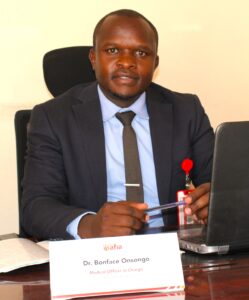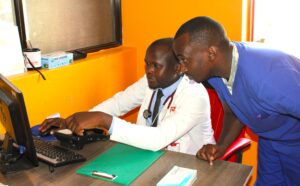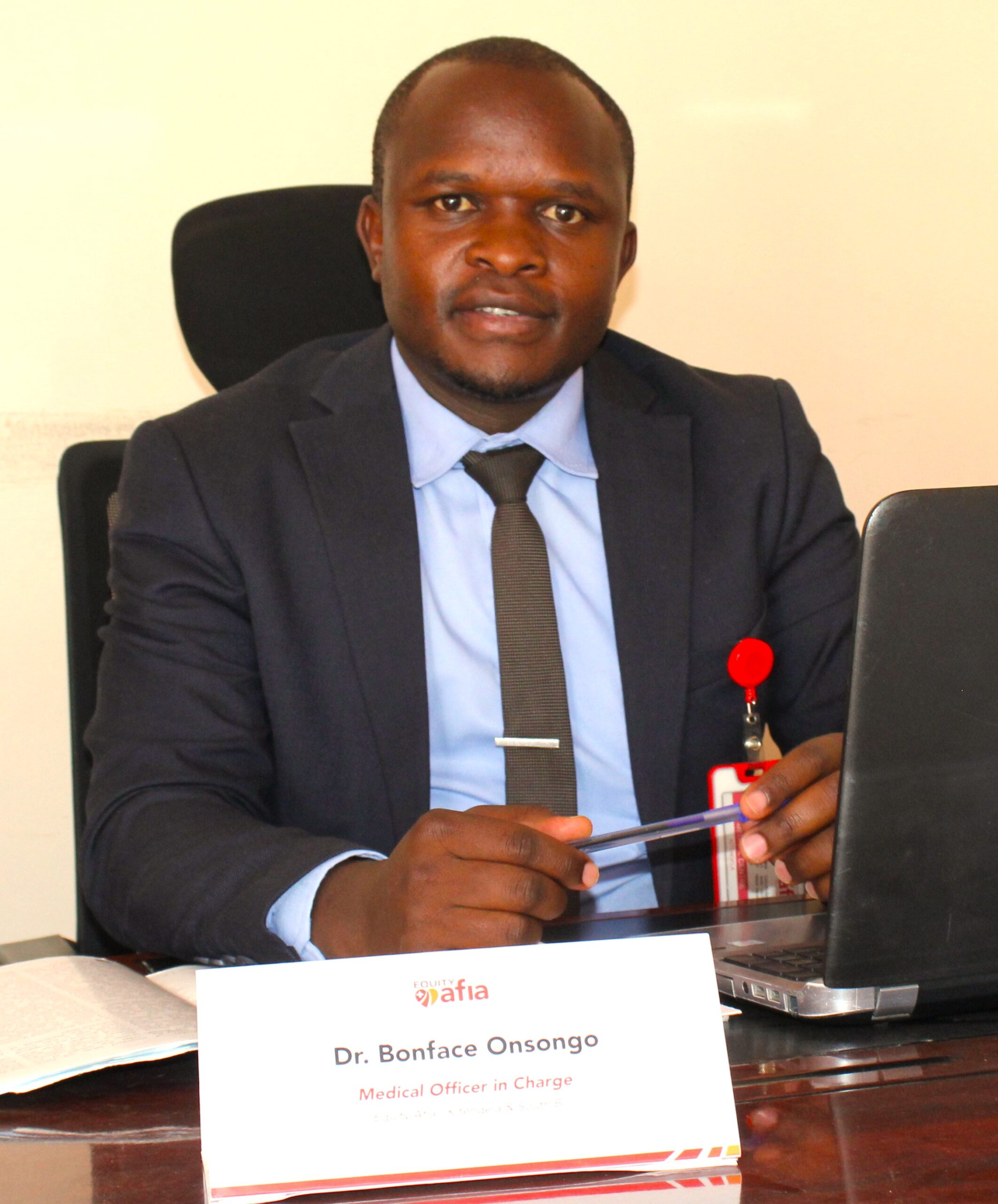While thousands of graduate doctors continue to lament the lack of employment opportunities in government, one youthful doctor chose not to focus on that, instead consolidating his wits, profession, and positive networking to drive the dream of a healthy society.
The academic and professional journey of Boniface Onsongo, a medical doctor by training, is as challenging as it is inspiring.
Born into a humble family in Kisii, Onsongo would later move to Kitale with his mother in 2002, leaving his father behind. He went through part of his basic education at Tuwani Primary School in Kisumu Ndogo slum, going through Classes 4, 5, and 6. His early life was not an easy experience, as the last born in a family of five would tell this writer.

“My mother struggled to provide for us from the small business of selling simsim and other candies on the roadside,” he says.
“I suffered low self-esteem as a young boy in primary school, especially when I got to Class 7, and this affected my performance.”
Then a trying moment that would remain stamped in his mind came into the life of Onsongo: the sudden and brief stint of illness and the subsequent death of his mother.
He narrates that she collapsed at her place of business, profusely vomiting blood, and was later rushed to Kitale Referral Hospital, where she was diagnosed with leukemia and meningitis. She later passed on.
After the painful experience of the death of his mother, Onsongo was taken in by his elder sister, who lived in Nairobi’s Mukuru kwa Njenga slum, before going back to Kisii, where he enrolled at Nyambusi Academy, where he confesses to having been a slow learner. He says this did not deter him; instead, it made him refresh his passion for books.
Years moved, and the young boy did impressively well in his Kenya Certificate of Primary Education (KCPE) examination, attaining 365 marks and getting admission to Kisii High School. Here, he became more determined with his studies than ever.
The journey through high school would not be smooth either, considering his underprivileged family background. His peasant father was not able to educate him, as he sold everything he had to see him through secondary school, he narrates.
“I remember for three years, I would be sent home from school several times for lack of school fees,” he says, adding that his back-and-forth from school could not hinder his resolve to study.
The rough road through high school notwithstanding, Onsongo left Kisii High School in 2011 having scored an impressive A of 83 points, leaving behind a huge debt of Ksh365,000 in unpaid fees, thanks to tutors who saw potential in him and agreed to let him learn without disruption. The money would be paid gradually in a mutual agreement with school management, he says.
By now, Onsongo was looking forward to a bright future. Before he was called to Kenyatta University to pursue medicine and surgery during the double intake of 2012, he was offered an internship by the Equity Bank Kisii branch, where he got a rare opportunity to be taken through the Equity Leadership Program (ELP).

The Equity Leadership Program helped him get the right concept of life, career choice, and other important life skills.
“This program helped me a lot to broaden my perspective of life, and I thank Equity Foundation for it,” he says.
The program gave Onsongo an edge to be elected as Secretary-General of the Association of Kenyatta University Medical Students (AKUMS), a position he served in with passion.
While at Kenyatta University, Onsongo remained focused on his dream of attaining academic excellence and career accomplishment.
As the years progressed, the young man eventually graduated from Kenyatta University in Medicine and Surgery (MBCHB) in 2018.
Soon after he was out of university, the fresh graduate doctor went into a one-year mandatory internship at the Kisii Teaching and Referral Hospital (KTRH), where he was graciously introduced to Equity Afia, a model by the Equity Bank Foundation designed to offer induction and career guidance for the youth. The model, he confesses, helped open up his mind to managerial and leadership skills vital to running any enterprise.
After the lapse of the internship period, the self-driven graduate would venture back to Nairobi to share the knowledge and skills he acquired from the noble Equity Afia model with others at a medical facility in Buruburu. By now, the young doctor was burning with passion to reach more people with his fresh knowledge and skills towards attaining better health for all. It is at this critical point that Dr. Onsongo started the Stable Health Foundation, under which he mobilized resources and expertise to open the Kitengela Equity Afia Medical Center in Kitengela Town in 2021.
As the founder and CEO of the Stable Health Foundation, Onsongo aims to meet the health needs of the community around him by conducting medical outreaches to educate people on curative and preventive approaches to better health.
The Kitengela facility has 14 staff, all permanently serving in various general departments. There are two nurses, two doctors, and two laboratory technicians. There are also dermatologists, oncologists, and ear, nose, and throat (ENT) experts.
Onsongo explains that his Medical Centre is not a business per se, but a point to offer solutions to different health conditions. It operates 24 hours a day.
“We are not selling products and services, we give solutions,” he says. “We first understand the problem and then offer accurate solutions to lifestyle diseases affecting people.”
Stable Health Foundation also organizes a series of medical camps around schools in Kajiado County to give much-needed guidance to learning institutions and health facilities on preventable lifestyle conditions like diabetes, cancer, and hypertension.
Asked about his plans, Onsongo says he plans to expand to offering ambulance services to be able to respond quickly to the emergency needs of the community, on top of introducing affordable medical insurance for his clientele.
On the healthcare area, he wishes the government to address, he singles out E-medicine, saying it is capable of providing quick, first-hand solutions to different health conditions at the touch of a button, observing that if given the attention and support it deserves from health stakeholders, it can accommodate millions of patients at one go, hence reducing congestion in public hospitals.
